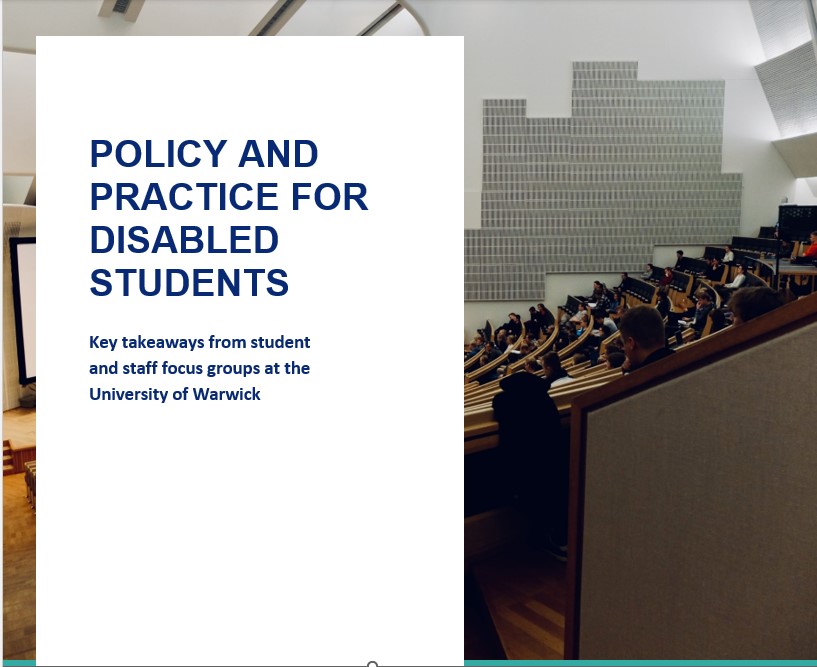Stakeholder engagement to create content for a code of practice to support disabled students
Aims of the project
This project aims to provide content for a new code of practice to support disabled students in their academic learning experience and broader student experience across the University of Warwick, through engagement with disabled students and in partnership with other key stakeholders across the university, including academic and professional services staff. A co-creative approach was adopted in keeping with the disability rights slogan, “nothing about us without us”. We ensured that disabled students would be centred not only as research subjects or beneficiaries, but through meaningful involvement, participation and collaboration throughout all stages of the project.
Project team: Dr Jagjeet Jutley-Neilson, Dr Elena Riva, Dr Gemma Gray, Prof Felicity Boardman, Sophie Kitching, Robyn EllisonProject Recommendations
Departmental Disability Checklist
Below are animations of staff and student case studies in the full project report.
Below are the case studies from the animations in the written format. Transcripts for the above animations are located in the full report appendix.
Staff Case Study one: Personal Tutoring
“I make sure to encourage a dialogue with my students. For example, I look up each tutee and check if they have disclosed a disability. I then reach out to suggest a one-to-one to chat. I also encourage all students to come and have a chat about how they’re getting on or if there’s any advice they need – I bring this up quite regularly in group meetings (especially at the start of term or in the run-up to reasonable adjustment deadlines). I try to make sure I have one-to-one chats with every tutee.”
This is a great example of good practice because:
- The staff member is taking the initiative to check student profiles and make sure they are aware of any disclosed disabilities.
- They are aware that not all students will have disclosed their disability (or necessarily even be aware of it), and make sure to extend support to all students rather than just those registered with the Disability Team.
- By engaging with students regularly and on a one-to-one basis, they are building rapport and encouraging students to be comfortable discussing their needs.
Staff Case Study two: Academic department inclusive practice lead
“As a department, we have a specific member of staff whose role includes responsibility for inclusive pedagogy. This ensures that inclusion isn’t dependent on a member of staff taking on the work in their spare time, and allows teaching staff to have the information and resources to be able to make their teaching more accessible.”
This is good practice because:
It ensures that inclusive pedagogy is always considered
- It reduces the reliance on staff going ‘above and beyond’.
- It increases the likelihood that intersectionality will be considered, as one person is working across the broad area, rather than individual staff members working within silos of knowledge.
Staff Case Study three:
Supporting disabled students and raising awareness via departmental events
“We’ve started to run specific events for disabled students in the department, on topics like employability. We work with student societies like Enable to promote them to students.”
This is an example of good practice because:
- There is a specific offering for disabled students, acknowledging they make have specific concerns and that one size does not fit all.
- There is collaboration with disabled student groups, seeing them as partners rather than opposition and valuing their contributions.
Student Case Study
“My lecturer kept sending out material that was really difficult for me to access because of my dyslexia. I sent them an email to explain the issue. They then changed the format to make it more dyslexia-friendly – this made a big difference to my learning.” (Zack)
Student Case Study
“There was a significant assessed presentation coming up in my course. I was worried, because I struggle with presentations, and it would have had a big impact on my grade. I contacted my department about my concerns. Their response was to give me – and all other students – the choice between doing a live presentation or pre-recording a video. They’ve even decided to keep this for future years of students!” (Sara)
Student Case Study
“My personal tutor sends me regular informal check-in emails – things like ‘Hi, how’s everything going?’. This makes me feel like they really care about me, and made me feel a lot more comfortable disclosing when I was struggling. They know to reach out more when I’m quieter because that’s when it makes the most difference. It really helps me.” (Eva)


